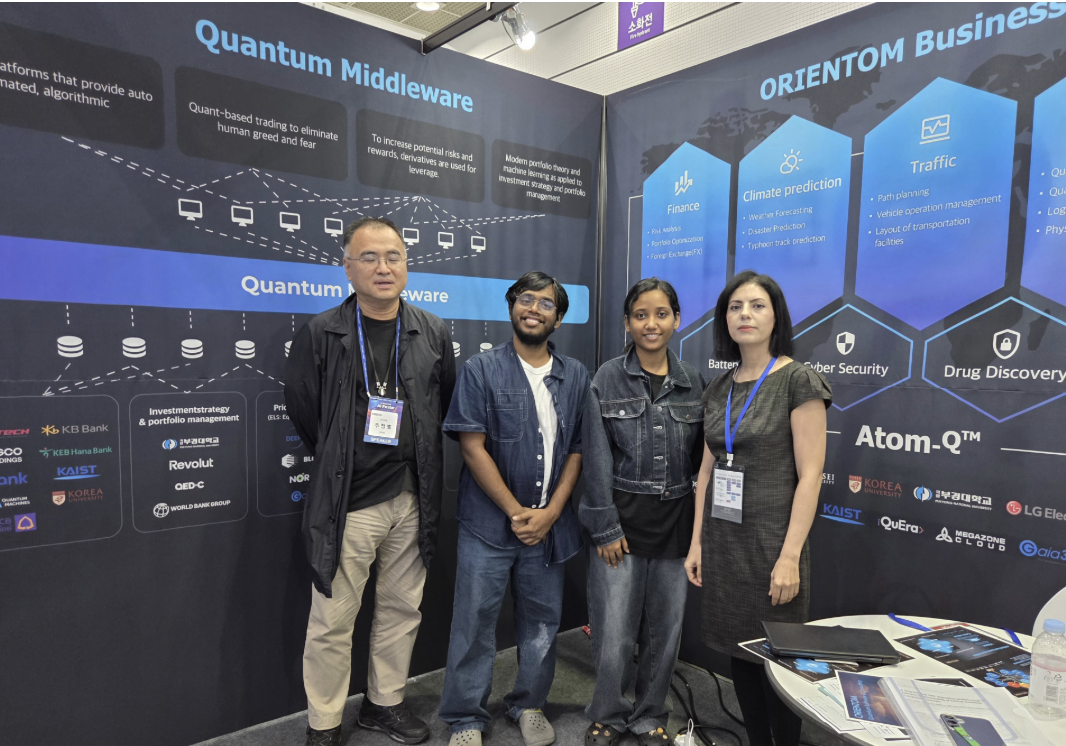Insider Brief
- At the Quantum 3.0 Forum during AI Festa, Orientom announced plans to build a complete quantum finance middleware platform by 2030, with applications already piloted at Kookmin Bank.
- Deputy Director Choo highlighted the limitations of conventional and quantum Monte Carlo methods for pricing complex derivatives and emphasized the need for hybrid quantum–classical algorithms.
- Orientom’s roadmap includes national projects with Kookmin Bank and Yonsei University, expansion into commercial finance, and future applications of hybrid algorithms to both financial modeling and high-performance computing domains.
PRESS RELEASE — At the “Quantum 3.0 Forum” of AI Festa, Deputy Director Choo (Chu) delivered a keynote titled “How far has quantum advantage come?” — stating that the platform will be applied to derivative products at Kookmin Bank.
Orientom (CEO AlfredBang), which develops quantum-based financial algorithms, plans to build a middleware platform comprising complete quantum finance algorithms by 2030.
At the Quantum 3.0 forum held as part of AI Festa, Orientom’s Deputy Director Choo Jeong-ho disclosed the company’s quantum finance strategy and future vision.
First, Choo pointed out the limitations of conventional models used today in pricing derivatives and risk management. For instance, the pricing of complex derivatives such as ELS (Equity-Linked Securities) depends on many probabilistic variables—like underlying asset behavior, volatility, and correlations. When using Monte Carlo simulation based on the Black–Scholes model, computational costs increase sharply and accuracy is limited.
To reduce the complexity of such financial modeling, current quantum Monte Carlo approaches also face computational limits. Thus, Choo said, many are turning to hybrid quantum–classical algorithms.
Choo added, “We are working on a national project related to derivative product valuation with Kookmin Bank and Yonsei University, and we’ve seen meaningful results in pilot tests so far. We aim to develop algorithms usable in real commercial financial environments.”
He also referenced global financial firms’ adoption of quantum algorithms. For example, HSBC reportedly improved prediction accuracy by 34% in a bond trading experiment in collaboration with Company I.
Research and development for practical quantum applications in finance is active. Goldman Sachs is studying option pricing via quantum algorithms, JP Morgan Chase is working on quantum financial modeling and portfolio optimization, and Barclays is doing quantum-based risk simulation pilot projects.
Choo said, “Some algorithms currently prove efficient at early experimental stages. The quantum platform we develop will change the computational paradigm in finance.”
He also revealed Orientom’s plan to enter the quantum finance market. If quantum computing is applied to complex products like ELS, the efficiency of pricing computation and risk management could improve substantially.
“By 2030, Orientom will build a middleware platform encompassing the full set of financial algorithms,” Choo said. “It will include quantum computing modules adaptable to various financial products and aim to offer a cloud-hub service with interfaces that allow users to apply them easily.”
Choo also emphasized that quantum computing must evolve from a laboratory technology into a technique that solves problems in industrial settings.
In related commentary, he noted, “If hybrid algorithms can be well applied to finance, the same algorithms could be extended to conventional HPC domains, and particularly we’d like to challenge the notoriously difficult fluid dynamics problems.”
Meanwhile, Orientom plans to hasten practical deployment by developing a hybrid platform that is field-friendly, focusing initially on Korea’s financial sector.




0 Comments